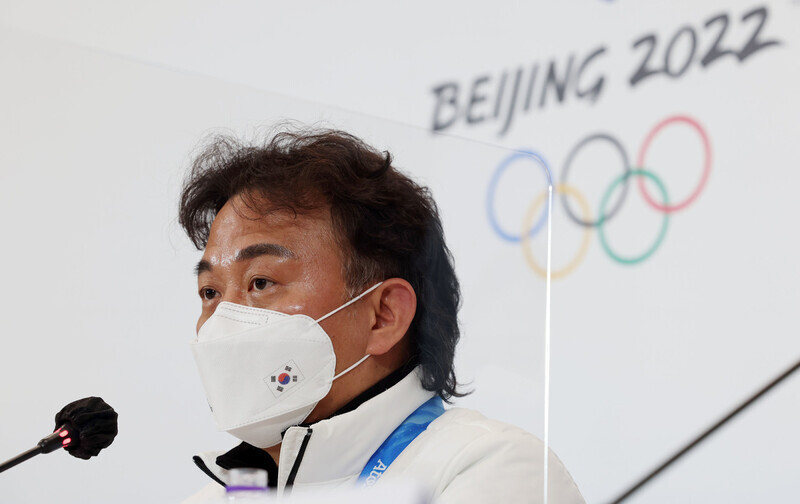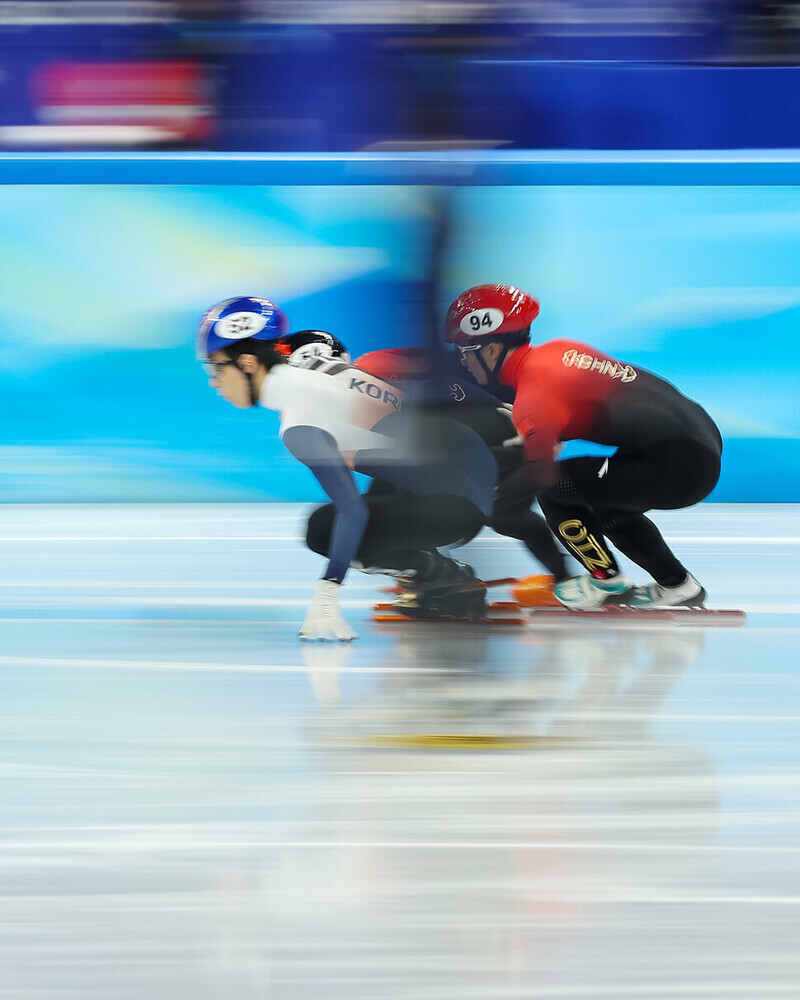hankyoreh
Links to other country sites 다른 나라 사이트 링크
S. Korean Olympic delegation: Repeated bad referee calls should be “considered intentional”

After a controversial referee call disqualified two South Korean skaters during a short track speedskating event, the South Korean Olympic team held a press conference and strongly disputed the decision, saying it will do everything in its power to make sure such an incident never happens again.
The conference, held Tuesday at the Beijing Olympics Main Media Center, was joined by Yoon Hong-geun, head of the South Korean athletic delegation to the Beijing Olympics; You In-tak, deputy head of the delegation; Choi Yong-koo, head of support for the South Korean short track team; and South Korean short track coach Lee So-hee. At the conference, the delegation said, “Young athletes sacrificed their youth and made painstaking efforts for this very occasion. We will do everything possible following due process to immediately file an appeal with the Court of Arbitration for Sport (CAS).”
On Monday, South Korean skaters Hwang Dae-heon and Lee June-seo were disqualified for lane change penalties during the men’s 1000-meter short track speedskating semifinals at Capital Indoor Stadium. When Hungary’s Shaolin Sandor Liu was penalized and subsequently disqualified at the event’s finals after finishing first, allowing China to take the gold and silver, many called the referees’ decisions biased. Chinese skaters had not once finished first at the day’s event.
Afterward, the South Korean athletic delegation immediately appealed the disqualification of Hwang and Lee. However, the International Skating Union (ISU) dismissed the appeal, saying appeals against referee calls aren’t accepted. Yoon said, “We appointed a team of lawyers right away after looking into the appeals history at the CAS and are in the process of confirming the appeals procedure. We plan to promptly file an appeal as soon as we finish [our investigation].”
Choi, who is also an ISU referee, explained, “In terms of Hwang’s penalty situation, the Chinese skater repeatedly impeded Hwang from overtaking him, so Hwang tried to pass him from the inside. There was enough space right from the beginning of the corner, so Hwang made the pass without difficulty, and there was no contact at all. I think the referees made the wrong call after misinterpreting the gesture the Chinese skater made. Hwang shouldn’t have been disqualified, because there was no contact.”

He continued, “For Lee, he started off the race normally from the inside lane and made his way to the second in the pack, skating without issue around the same corner while the third and fourth spots were occupied by a Hungarian skater and a Chinese skater, respectively. The referees disqualified Lee because he made a sharp pass on the inside, but from my review of the footage, I think the Hungarian and Chinese skaters were in the wrong.”
He also added, “Referee calls should not govern competitions. Referees are assistants to the race who make accurate judgments on wrongful moves. I believe that all five skaters competing in the finals could have been disqualified. At the finish line, [a Chinese skater] uses both of his hands with his arms open to pull on [his competitors]. As a referee, I cannot in the least understand why the Hungarian skater was disqualified.” He also said, “When repeated, mistaken referee calls should be considered intentional.”
However, it’s unrealistic to expect the refereeing decisions to be overturned even if they are appealed at the CAS. The CAS has maintained in the past that even the clearest judging blunders cannot be overturned if they were a result of human error, not undeniable corruption such as bribery.
Still, the Korean Sport & Olympic Committee said it will take strong measures to prevent unfair referee calls in the remaining events and beyond, such as by directly appealing to Thomas Bach, the president of the International Olympic Committee.
By Lee Jun-hee, staff reporter
Please direct questions or comments to [english@hani.co.kr]
Editorial・opinion
![[Editorial] Intensifying US-China rivalry means Seoul must address uncertainty with Beijing sooner than later [Editorial] Intensifying US-China rivalry means Seoul must address uncertainty with Beijing sooner than later](https://flexible.img.hani.co.kr/flexible/normal/500/300/imgdb/original/2024/0517/8117159322045222.jpg) [Editorial] Intensifying US-China rivalry means Seoul must address uncertainty with Beijing sooner than later
[Editorial] Intensifying US-China rivalry means Seoul must address uncertainty with Beijing sooner than later![[Column] When ‘fairness’ means hate and violence [Column] When ‘fairness’ means hate and violence](https://flexible.img.hani.co.kr/flexible/normal/500/300/imgdb/original/2024/0516/7417158465908824.jpg) [Column] When ‘fairness’ means hate and violence
[Column] When ‘fairness’ means hate and violence- [Editorial] Yoon must stop abusing authority to shield himself from investigation
- [Column] US troop withdrawal from Korea could be the Acheson Line all over
- [Column] How to win back readers who’ve turned to YouTube for news
- [Column] Welcome to the president’s pity party
- [Editorial] Korea must respond firmly to Japan’s attempt to usurp Line
- [Editorial] Transfers of prosecutors investigating Korea’s first lady send chilling message
- [Column] Will Seoul’s ties with Moscow really recover on their own?
- [Column] Samsung’s ‘lost decade’ and Lee Jae-yong’s mismatched chopsticks
Most viewed articles
- 1For new generation of Chinese artists, discontent is disobedience
- 2[Column] US troop withdrawal from Korea could be the Acheson Line all over
- 3[Editorial] Transfers of prosecutors investigating Korea’s first lady send chilling message
- 4[Exclusive] Unearthed memo suggests Gwangju Uprising missing may have been cremated
- 5[Editorial] Intensifying US-China rivalry means Seoul must address uncertainty with Beijing sooner t
- 6Xi, Putin ‘oppose acts of military intimidation’ against N. Korea by US in joint statement
- 7China calls US tariffs ‘madness,’ warns of full-on trade conflict
- 8Could Korea’s Naver lose control of Line to Japan?
- 9China, Russia put foot down on US moves in Asia, ratchet up solidarity with N. Korea
- 10For Korea’s Justice Ministry, no place is sacred from immigration raids